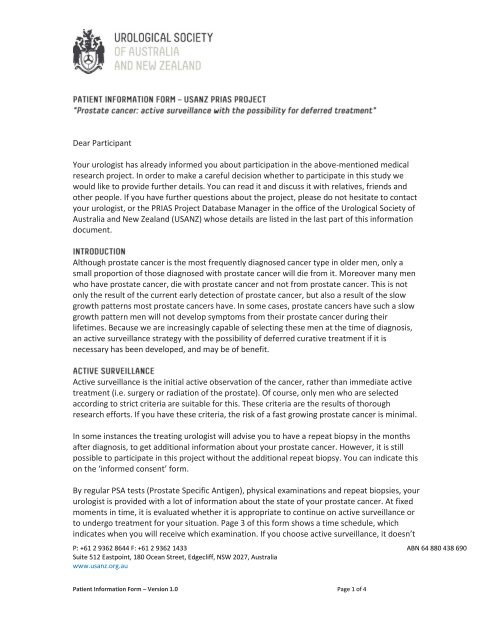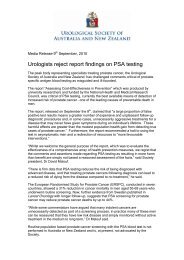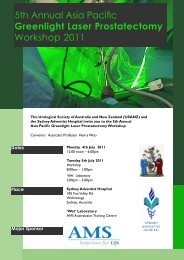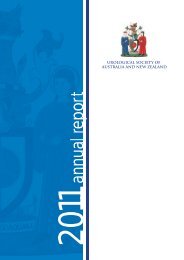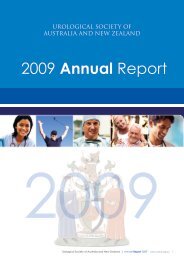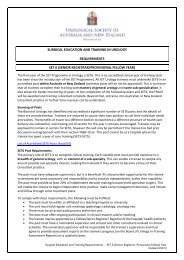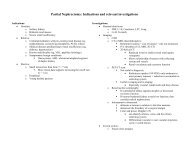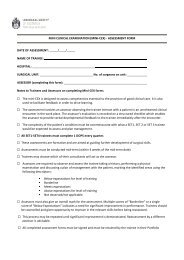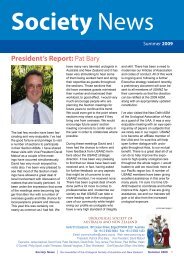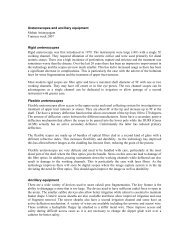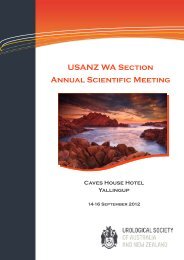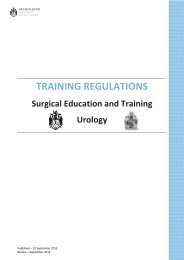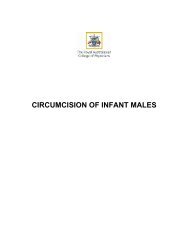Patient Information Form - Urological Society of Australia and New ...
Patient Information Form - Urological Society of Australia and New ...
Patient Information Form - Urological Society of Australia and New ...
You also want an ePaper? Increase the reach of your titles
YUMPU automatically turns print PDFs into web optimized ePapers that Google loves.
Dear ParticipantYour urologist has already informed you about participation in the above-mentioned medicalresearch project. In order to make a careful decision whether to participate in this study wewould like to provide further details. You can read it <strong>and</strong> discuss it with relatives, friends <strong>and</strong>other people. If you have further questions about the project, please do not hesitate to contactyour urologist, or the PRIAS Project Database Manager in the <strong>of</strong>fice <strong>of</strong> the <strong>Urological</strong> <strong>Society</strong> <strong>of</strong><strong>Australia</strong> <strong>and</strong> <strong>New</strong> Zeal<strong>and</strong> (USANZ) whose details are listed in the last part <strong>of</strong> this informationdocument.Although prostate cancer is the most frequently diagnosed cancer type in older men, only asmall proportion <strong>of</strong> those diagnosed with prostate cancer will die from it. Moreover many menwho have prostate cancer, die with prostate cancer <strong>and</strong> not from prostate cancer. This is notonly the result <strong>of</strong> the current early detection <strong>of</strong> prostate cancer, but also a result <strong>of</strong> the slowgrowth patterns most prostate cancers have. In some cases, prostate cancers have such a slowgrowth pattern men will not develop symptoms from their prostate cancer during theirlifetimes. Because we are increasingly capable <strong>of</strong> selecting these men at the time <strong>of</strong> diagnosis,an active surveillance strategy with the possibility <strong>of</strong> deferred curative treatment if it isnecessary has been developed, <strong>and</strong> may be <strong>of</strong> benefit.Active surveillance is the initial active observation <strong>of</strong> the cancer, rather than immediate activetreatment (i.e. surgery or radiation <strong>of</strong> the prostate). Of course, only men who are selectedaccording to strict criteria are suitable for this. These criteria are the results <strong>of</strong> thoroughresearch efforts. If you have these criteria, the risk <strong>of</strong> a fast growing prostate cancer is minimal.In some instances the treating urologist will advise you to have a repeat biopsy in the monthsafter diagnosis, to get additional information about your prostate cancer. However, it is stillpossible to participate in this project without the additional repeat biopsy. You can indicate thison the ‘informed consent’ form.By regular PSA tests (Prostate Specific Antigen), physical examinations <strong>and</strong> repeat biopsies, yoururologist is provided with a lot <strong>of</strong> information about the state <strong>of</strong> your prostate cancer. At fixedmoments in time, it is evaluated whether it is appropriate to continue on active surveillance orto undergo treatment for your situation. Page 3 <strong>of</strong> this form shows a time schedule, whichindicates when you will receive which examination. If you choose active surveillance, it doesn’tP: +61 2 9362 8644 F: +61 2 9362 1433 ABN 64 880 438 690Suite 512 Eastpoint, 180 Ocean Street, Edgecliff, NSW 2027, <strong>Australia</strong>www.usanz.org.au<strong>Patient</strong> <strong>Information</strong> <strong>Form</strong> – Version 1.0 Page 1 <strong>of</strong> 4
mean you will not be treated, but treatment is <strong>of</strong>fered if there is evidence that treatment hasbecome necessary.The goal <strong>of</strong> this research project is to study differences between men who elect immediatetreatment <strong>and</strong> those who elect to postpone treatment for their prostate cancer. This will bemeasured by means <strong>of</strong> the need for treatment, spread <strong>of</strong> the cancer, death from prostatecancer <strong>and</strong> quality <strong>of</strong> life. Until now, the studies that have looked at this would suggest there isno difference between the two groups. In addition to participating in a global study, you can beconfident that your surveillance will be managed using an internationally agreed protocol.As long as no treatment for your prostate cancer is needed, the major advantage <strong>of</strong> activesurveillance is to avoid side effects which prostate cancer treatments can have, such asincontinence <strong>and</strong>/or impotence.However, you should realise that by choosing active surveillance, you would be living with acancer, which is initially not being treated. This knowledge can be an emotional burden for somemen.PSA is a protein which is produced by the prostate. The amount <strong>of</strong> PSA available in blood is ameasure <strong>of</strong> the amount <strong>of</strong> PSA produced by the prostate. Changes in the PSA level thereforeroughly reflect the activity <strong>of</strong> your prostate cancer. Based on these changes in PSA, togetherwith the physical examination <strong>and</strong> additional examinations if needed, your doctor will adviseyou what to do.If you choose active surveillance, a PSA test will be performed every three months in the firsttwo years <strong>and</strong> every six months thereafter. These visits are called laboratory (lab) visits <strong>and</strong> youmay not require direct contact with your urologist. At 6, 12, 18 <strong>and</strong> 24 months, <strong>and</strong> annuallythereafter evaluation visits will be scheduled. This means you will then visit your urologist. Yoururologist may choose to have evaluation visits more frequently. Please find the time schedule onthe next page. At the evaluation visits, not only a PSA test is performed, but a physicalexamination is performed as well. The physical examination includes a digital rectalexamination. Additionally, after 1, 4, 7 <strong>and</strong> 10 years, <strong>and</strong> every five years thereafter a repeatbiopsy is scheduled. You urologist will explain <strong>and</strong> evaluate all parameters <strong>and</strong> will advise youwhat to do. If the situation is stable he will advise you to continue on active surveillance;otherwise deferred treatment is advised.Years in which no st<strong>and</strong>ard biopsy is scheduled (table 1), a situation might occur in which thePSA test <strong>and</strong> the physical examination will not provide the urologist with enough information. Inthese circumstances, an additional biopsy may be advised. Supported by the extra informationfrom the biopsy, your urologist can then provide you with a well informed advice about yourprostate cancer.
If you decide not to participate in this project, you will receive st<strong>and</strong>ard care. Please note thatthis decision will not have any consequences for the quality <strong>of</strong> care you will receive. Alternativeoptions can be discussed with your doctor.There are no extra costs associated with this research project. Furthermore will you not receivea fee for participation. The follow-up schedule for active surveillance is very similar to that whichwould occur after treatment, so the only additional time commitment <strong>of</strong> this study is the extrabiopsies, but there are overall time savings for you because treatment is avoided or delayed.Your personal information, which will be gathered for the study can only be accessed by alimited number <strong>of</strong> persons, <strong>and</strong> only after you have given a written consent for it. These personsare members <strong>of</strong> the research team, the medical inspection <strong>and</strong> members <strong>of</strong> the ethical board.Access can be necessary to study the quality <strong>and</strong> reliability <strong>of</strong> the research project. The law onprotection <strong>of</strong> personal information <strong>and</strong> the privacy rules <strong>of</strong> the hospital will be followed.A unique identification number will substitute personal information. Only that number will beP: +61 2 9362 8644 F: +61 2 9362 1433 ABN 64 880 438 690Suite 512 Eastpoint, 180 Ocean Street, Edgecliff, NSW 2027, <strong>Australia</strong>www.usanz.org.au<strong>Patient</strong> <strong>Information</strong> <strong>Form</strong> – Version 1.0 Page 3 <strong>of</strong> 4
used in analyses <strong>and</strong> scientific publications. Only those who know which number corresponds towhich patient (the study physicians data managers <strong>and</strong> your urologist) can make the link to youas a person. The data will be stored for 15 years after the research project has ended, but only ifyou give consent for it.This research project has been reviewed by the Ethics Committee <strong>of</strong> the Royal AustralasianCollege <strong>of</strong> Surgeons (RACS) <strong>and</strong> also by the Board <strong>of</strong> Directors <strong>of</strong> the <strong>Urological</strong> <strong>Society</strong> <strong>of</strong><strong>Australia</strong> <strong>and</strong> <strong>New</strong> Zeal<strong>and</strong> (USANZ). The international guidelines for this type <strong>of</strong> research will beobeyed carefully.Participation in this project is completely voluntarily. If you do not want to participate, you donot have to explain why. If you give us your consent, but after reconsideration decide that youdo not want to participate anymore, it is possible to withdraw your consent at any time, withoutgiving a reason. The research project will be executed by its initial plan, although there arecircumstances in which we feel it is necessary to change the initial plan. In that case,modifications will be discussed with you; so you can decide whether you still want toparticipate. If your personal safety is in danger, your urologist will end your participation in thisproject.Please feel free to contact your urologist if you have any questions or critics about the researchproject after having read this information. Questions can also be directed to:<strong>Urological</strong> <strong>Society</strong> <strong>of</strong> <strong>Australia</strong> <strong>and</strong> <strong>New</strong> Zeal<strong>and</strong>Suite 512, 180 Ocean StEDGECLIFF NSW 2027AUSTRALIAEmail: priasinfo@usanz.org.auPhone: +61 2 9362 8644


